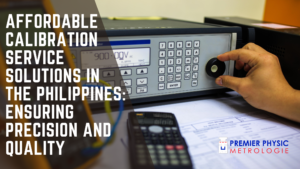In an increasingly interconnected global economy, the accuracy and reliability of measurements are paramount for industries to thrive. Whether it’s ensuring the safety of food and pharmaceuticals, maintaining the precision of manufacturing processes, or guaranteeing the integrity of electronic components, accurate measurements underpin quality, safety, and fair trade. For Philippine industries striving for international competitiveness and adherence to global best practices, understanding and implementing global calibration standards is not merely an option, but a necessity. This comprehensive guide explores the profound impact of global calibration standards on various sectors within the Philippines, detailing the key standards, their benefits, the challenges of implementation, and the way forward for Philippine businesses.
The Importance of Calibration: A Foundation for Trust and Quality
Calibration, at its core, is the process of comparing a measurement instrument to a known standard of higher accuracy to detect and correct any discrepancies in its readings. This seemingly technical process has far-reaching implications for industries:
- Ensuring Accuracy and Reliability: Calibration guarantees that instruments provide measurements within acceptable tolerances, leading to reliable data for decision-making, quality control, and safety protocols.
- Maintaining Quality Standards: In manufacturing, calibrated equipment ensures consistent product quality, reducing defects, waste, and the risk of recalls. This is crucial for meeting both local and international quality standards.
- Facilitating Trade and Interoperability: Adherence to global calibration standards ensures that measurements taken in the Philippines are compatible and comparable with those taken elsewhere, facilitating international trade and the interoperability of equipment and processes.
- Regulatory Compliance: Many industries in the Philippines are subject to local and international regulations that mandate the use of calibrated equipment. Compliance with global standards often satisfies or exceeds these requirements.
- Building Customer Confidence: When businesses can demonstrate that their products and services are based on accurate and traceable measurements, it builds trust with customers both domestically and internationally.
- Improving Efficiency and Reducing Costs: Accurate measurements lead to optimized processes, reduced material waste, and minimized energy consumption, ultimately contributing to cost savings and improved efficiency.
- Enhancing Safety: In critical sectors like healthcare and transportation, accurately calibrated instruments are vital for ensuring safety and preventing accidents.
Key Global Calibration Standards and Their Relevance to the Philippines:
Several international organizations and standards play a significant role in shaping calibration practices worldwide, and their influence is increasingly felt in the Philippines:
- ISO/IEC 17025:2017 (General Requirements for the Competence of Testing and Calibration Laboratories): This is the most widely recognized international standard for calibration laboratories. Accreditation to ISO/IEC 17025 demonstrates a laboratory’s technical competence, quality management system, and ability to produce technically valid results. For Philippine calibration laboratories seeking international recognition and the ability to provide globally accepted calibration certificates, achieving ISO/IEC 17025 accreditation is paramount. This accreditation enhances their credibility, facilitates mutual recognition agreements with other accreditation bodies worldwide, and enables Philippine industries to access calibration services that meet international benchmarks.
- NIST (National Institute of Standards and Technology): While NIST is the national metrology institute for the United States, its standards and best practices are highly influential globally. NIST develops and maintains the primary measurement standards for the US, and its research and publications often serve as a reference for calibration laboratories and industries worldwide, including in the Philippines. Traceability to NIST standards provides a high level of confidence in the accuracy of measurements.
- ISO 9001:2015 (Quality Management Systems): This standard specifies requirements for a quality management system (QMS) that an organization can use to consistently provide products and services that meet customer and applicable statutory and regulatory requirements. Calibration is an integral part of an effective QMS under ISO 9001, ensuring that measuring equipment used in production, quality control, and other processes is regularly calibrated and traceable to recognized standards. Compliance with ISO 9001 demonstrates a commitment to quality, which often includes adherence to sound calibration practices aligned with global benchmarks.
- ILAC (International Laboratory Accreditation Cooperation): ILAC is an international organization that facilitates trade and supports regulators by operating a worldwide mutual recognition arrangement (MRA) among competent accreditation bodies. Accreditation bodies in the Philippines that are signatories to the ILAC MRA ensure that the calibration certificates issued by their accredited laboratories are recognized and accepted in other countries that are also part of the MRA. This significantly benefits Philippine industries involved in international trade, as they can rely on locally calibrated instruments with globally recognized traceability.
- Other Industry-Specific Standards: Various industries have their own specific calibration requirements and standards. For example, the pharmaceutical industry often adheres to Good Manufacturing Practice (GMP) guidelines, which include stringent requirements for the calibration of equipment used in drug manufacturing and quality control. The food and beverage industry follows standards related to food safety, which necessitate the accurate calibration of temperature sensors, weighing scales, and other measuring devices. The healthcare sector has specific calibration standards for medical devices to ensure patient safety and the accuracy of diagnoses and treatments. Adherence to these global industry-specific standards is crucial for Philippine companies operating in these sectors, especially if they are exporting products or seeking international certifications.
Impact on Key Philippine Industries:
The adoption and adherence to global calibration standards have a significant impact on various sectors within the Philippines:
- Manufacturing: For the Philippines’ manufacturing sector, which includes electronics, automotive parts, food and beverage, and garments, global calibration standards are crucial for maintaining product quality, reducing waste, and ensuring competitiveness in international markets. Accurate calibration of production machinery, testing equipment, and quality control instruments ensures that products meet the required specifications and comply with international standards, facilitating exports and attracting foreign investment.
- Food and Beverage: In the Philippines’ food and beverage industry, adherence to global calibration standards is vital for ensuring food safety and preventing foodborne illnesses. Accurate calibration of temperature sensors in cooking and cooling processes, pH meters, weighing scales, and other measuring devices guarantees that food products are processed and stored under safe conditions, meeting both local FDA regulations and international food safety standards, thereby enhancing consumer trust and facilitating exports.
- Pharmaceuticals and Healthcare: The pharmaceutical and healthcare sectors in the Philippines have stringent requirements for the calibration of medical devices, laboratory equipment, and manufacturing instruments. Compliance with global standards such as GMP and ISO 13485 (for medical devices) ensures the accuracy of diagnoses, the effectiveness of treatments, and the safety of pharmaceutical products. Properly calibrated equipment is essential for patient safety and for Philippine healthcare providers and pharmaceutical companies to meet international quality benchmarks and potentially participate in global healthcare supply chains.
- Electronics: The Philippines is a significant player in the electronics manufacturing industry. Global calibration standards are essential for ensuring the accuracy and reliability of testing and measurement equipment used in the production of semiconductors, electronic components, and other devices. Adherence to these standards guarantees the quality and performance of Philippine-made electronics, enhancing their competitiveness in the global market and attracting multinational electronics companies.
- Agriculture and Cold Chain: Maintaining the quality and safety of agricultural products, especially for export, relies heavily on accurate temperature monitoring throughout the cold chain. Global calibration standards for temperature sensors used in refrigerated transport and storage facilities ensure that perishable goods are maintained at the correct temperatures, reducing spoilage and meeting international phytosanitary requirements.
- Energy: In the energy sector, accurate calibration of energy meters, flow meters, and other measuring devices is crucial for fair billing, efficient energy distribution, and regulatory compliance with the Energy Regulatory Commission (ERC). Adherence to global standards ensures the reliability of energy measurements and promotes transparency in the energy market.
Challenges in Implementing Global Calibration Standards in the Philippines:
Despite the numerous benefits, Philippine industries may face several challenges in implementing global calibration standards:
- Cost of Calibration Services and Equipment: Access to accredited calibration laboratories and the purchase of high-precision calibration equipment can be expensive, particularly for small and medium-sized enterprises (SMEs) in the Philippines.
- Lack of Awareness and Expertise: Some Philippine businesses may lack awareness of the importance of global calibration standards or may not have the in-house expertise to implement and maintain proper calibration programs.
- Infrastructure Limitations: The availability of accredited calibration laboratories with the necessary capabilities and geographical reach across the Philippines may be limited in certain regions.
- Complexity of Standards: Navigating the requirements of various global standards (ISO/IEC 17025, ISO 9001, industry-specific standards) can be complex and require significant effort for implementation.
- Ensuring Traceability: Establishing and maintaining traceability of measurements to recognized national or international standards can be challenging without proper guidance and infrastructure.
- Resistance to Change: Some organizations may resist adopting new calibration practices due to established routines or a perceived lack of immediate return on investment.
Moving Forward: Strategies for Enhanced Adoption:
To overcome these challenges and promote the wider adoption of global calibration standards in the Philippines, several strategies can be implemented:
- Government Support and Incentives: The Philippine government can play a crucial role by providing financial assistance, tax incentives, or subsidies to help SMEs access accredited calibration services and invest in necessary equipment.
- Awareness Campaigns and Training Programs: Conducting nationwide awareness campaigns and providing accessible training programs on the importance and implementation of global calibration standards can help build expertise within Philippine industries.
- Development of Calibration Infrastructure: Investing in the establishment and expansion of accredited calibration laboratories across the Philippines, particularly in key industrial areas, will improve access to these vital services.
- Simplifying and Harmonizing Requirements: Efforts to simplify and harmonize local regulations with relevant global calibration standards can reduce the burden of compliance for Philippine businesses.
- Promoting Accreditation: Encouraging more Philippine calibration laboratories to seek accreditation to ISO/IEC 17025 and other relevant international standards will enhance the credibility and global recognition of local calibration services. The Philippine Accreditation Bureau (PAB) plays a crucial role in this by providing accreditation services.
- Industry Associations and Collaboration: Industry associations can facilitate the sharing of best practices, provide guidance on calibration requirements, and collectively advocate for policies that support the adoption of global standards.
- Integration into Educational Curricula: Incorporating the principles and importance of calibration into technical and engineering education in the Philippines will create a future workforce that understands and values accurate measurement practices.
The Role of the National Metrology Laboratory of the Philippines (NML):
The National Metrology Laboratory of the Philippines (NML), under the Department of Science and Technology’s Industrial Technology Development Institute (ITDI), plays a central role in establishing, maintaining, and disseminating national measurement standards that are internationally traceable. The NML provides calibration services for fundamental units of measurement and works to align Philippine measurement standards with global benchmarks. Strengthening the NML’s capabilities and outreach is crucial for supporting the adoption of global calibration standards across Philippine industries.
Conclusion:
In a globalized world, adherence to global calibration standards is no longer a luxury but a fundamental requirement for Philippine industries to ensure the quality, safety, and competitiveness of their products and services. By understanding the importance of these standards, addressing the challenges of implementation, and proactively adopting best practices, Philippine businesses can build trust with customers, comply with international regulations, and thrive in the global marketplace. The journey towards widespread adoption requires a collaborative effort involving the government, industry associations, calibration service providers, and individual businesses, all working together to elevate the standards of measurement in the Philippines to world-class levels. Embracing global calibration standards is an investment in the future of Philippine industries, paving the way for sustained growth, innovation, and international recognition.




